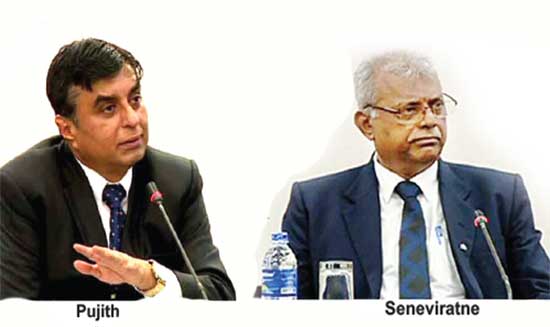News
CID was aware of possible attacks after detection of explosives at W’willuwa

By Rathindra Kuruwita
The CID was aware of the possibility of a terrorist attack following the detection of explosives at the Wanathawilluwa Jihadist Training Camp and had promptly informed former IGP Pujith Jayasundara about it, former SDIG of the CID, Ravi Seneviratne yesterday told the PCoI probing Easter Sunday attacks.
Seneviratne said the CID had begun investigating the attacks on the Buddha statues at Mawanella in December 2018 and the detection of explosives in Wanathawilluwa was a result of those investigations,
Seneviratne also told the PCoI that he had requested Jayasundara to inform the National Security Council (NSC) of the possi bility of a terrorist attack. The former IGP had said he no longer attended the NSC.
Seneviratne said: “Through these investigations we found information about National Thowheed Jamaat (NTJ) and its leader Zahran Hashim. It was Jayasundara who asked me to investigate the Mawanella incident and I instructed the Director and the DIG in charge of the CID to send a team to the area.”
The witness said that the CID had not been aware of Hashim’s direct links to extremist activists before the Wanathawilluwa raid. However, investigations had revealed that Hashim was a frequent visitor to the place.
“We also found a diagram of explosive devices,” he said.
The CID had also sent a progress report on the detection made at the Wanathawilluwa Jihadist Training camp to the IGP on January 26, 2019, Seneviratne said.
“Before the detection, the State Intelligence Service (SIS) had not shared their reports with us. However, after Wanathawilluwa, former Director of the SIS, SDIG Nilantha Jayawardena frequently shared information with the CID. We also spoke about the contents of the report over the phone.”
News
New thrust on bribery nets former ministers and cronies

The Commission to Investigate Allegations of Bribery or Corruption (CIABOC) sources said that plans were afoot to file charges in connection with 15 major fraud and corruption cases in the near future.
The Commission sources said that these cases stem from thorough investigations into complaints that had previously gone unexamined, with recent file reviews prompting the decision to proceed with legal action. The forthcoming charges are based on detailed inquiries that uncovered substantial evidence pointing to serious misconduct.
To date, CIABOC has initiated inquiries into over 300 complaints received during the recent period, reflecting an expanded commitment to tackling corruption at multiple levels of governance.
Commission sources said that several former ministers and political affiliates from past administrations are among those implicated in the ongoing investigations, though specific names have yet to be disclosed.
News
Online shoppers stick to cash on delivery amid digital payment hesitation

Despite global shifts toward digital transactions, Cash on Delivery (COD) remains the dominant payment method for online shopping in Sri Lanka, according to the Digital Outlook Sri Lanka 2025 Report by the Asia Pacific Institute of Digital Marketing (APIDM) and the University of Kelaniya.
The report reveals that 52 percent of Sri Lankan online shoppers prefer COD, up from 48 percent in the previous year, underscoring persistent consumer caution toward digital payments.
While debit/credit card usage has dipped slightly to 35 percent (from 39.5 percent last year), newer digital payment methods such as e-wallets/e-money apps lag at 1 percent or less. Installment-based “Buy Now, Pay Later” options account for 3 percent, reflecting modest traction. Online bank transfers, meanwhile, accounted for 8 percent (down from 9 percent last year).(aayubo.com)
News
Recruitment initiative to address shortage of academics

The Ministry of Education, Higher Education, and Vocational Education has launched a recruitment initiative aimed at addressing critical shortages in university academic staff across the country.
Deputy Minister Dr. Madura Seneviratne said that the recruitment process is being implemented at the university level to ensure that pressing needs are addressed efficiently and in alignment with institutional priorities.
The move comes in response to growing concerns raised by the Federation of University Teachers’ Associations (FUTA), which has pointed out that nearly 2,000 essential faculty positions remain unfilled across the country’s public universities, potentially impacting the quality of higher education and research output.Deputy Minister Seneviratne said that the recruitment process will be prioritized based on the urgency and significance of vacancies within individual universities and departments.
By Chaminda Silva
-

 News5 days ago
News5 days agoJapan-funded anti-corruption project launched again
-

 Sports4 days ago
Sports4 days agoOTRFU Beach Tag Rugby Carnival on 24th May at Port City Colombo
-

 News5 days ago
News5 days agoSethmi Premadasa youngest Sri Lankan to perform at world-renowned Musikverein in Vienna
-

 Business5 days ago
Business5 days agoNational Savings Bank appoints Ajith Akmeemana,Chief Financial Officer
-

 News2 days ago
News2 days agoRanil’s Chief Security Officer transferred to KKS
-

 Features3 days ago
Features3 days agoThe Broken Promise of the Lankan Cinema: Asoka & Swarna’s Thrilling-Melodrama – Part IV
-

 Features4 days ago
Features4 days agoTrump tariffs and their effect on world trade and economy with particular
-

 News3 days ago
News3 days agoRadisson Blu Hotel, Galadari Colombo appoints Marko Janssen as General Manager





















